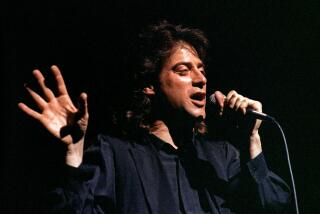Rocket Richard, the Pride of the Canadiens, Dead at 78
- Share via
Maurice Richard, whose fiery gaze and swift shot intimidated countless goaltenders during his Hall of Fame career with the Montreal Canadiens, died Saturday in Montreal.
Richard, 78, succumbed to the combined effects of a cancerous abdominal tumor and Parkinson’s disease. Medication for those ailments, and the osteoarthritis that most recently plagued him, rendered the onetime firebrand and opinionated newspaper columnist only intermittently lucid in his final days at Hotel-Dieu Hospital.
Richard, nicknamed “Rocket” for his speed, strength and indomitable will, became the NHL’s first 50-goal scorer in 1944-45 and the first to score 500 goals, in 1957-58. His record of 50 goals in 50 games was untouched until 1981, when it was matched by Mike Bossy of the New York Islanders; it wasn’t broken until Wayne Gretzky scored 50 in 39 games in the 1981-82 season.
“When he came flying toward you with the puck on his stick, his eyes were all lit up, flashing and gleaming like a pinball machine,” Hall of Fame goalie Glenn Hall once said. “It was terrifying.”
Richard, a Montreal native who played on eight Stanley Cup championship teams with the Canadiens, was hospitalized two years ago when doctors discovered his tumor. However, he responded well to treatments and was able to resume working as an ambassador for the Canadiens. After saying for many years the NHL should create a trophy for the top goal scorer, he presented the first Maurice Richard trophy to the NHL’s most prolific goal scorer, Teemu Selanne of the Mighty Ducks, at a 1999 ceremony in Toronto.
The son of a machinist for the Canadian Pacific Railway, Richard suffered a broken ankle and a broken arm early in his career and developed a reputation for being injury prone. However, coach Dick Irvin recognized the youngster’s skill and kept him with the team in 1943. Irvin later put Richard on the right side with Toe Blake and Elmer Lach, a trio that was known as the “Punch Line” for its scoring exploits. Richard was voted to the NHL’s first all-star team at right wing eight times and the second team six times. He also led the league in goals five times and was voted the most valuable player in 1947.
He passed Nels Stewart to become the NHL’s leading goal scorer, with 325, on Nov. 8, 1952, and scored his 500th goal on Oct. 19, 1957. He scored 544 goals, which stood until Gordie Howe surpassed it in 1963. His single-season record of 50 goals stood until Bobby Hull scored 54 in 1965-66.
After playing 18 seasons--the last five with his younger brother, Henri--he retired in 1960 after leading the Canadiens to an unprecedented and still unmatched fifth consecutive championship. But such was his stature in Montreal and the predominantly French-speaking province of Quebec that 40 years later, when King left wing Luc Robitaille passed Richard’s 544 goals, Robitaille spoke of him reverently, even though Richard had retired six years before Robitaille was born.
“It’s pretty special. He meant everything to the people of Quebec and to do this is a privilege,” Robitaille said. “I’m awed to be mentioned with him. He’s the Rocket. To any kid growing up in Montreal, he’s still the greatest.
“The older people would tell us about him and it was like we knew him.”
Richard always insisted, “I was just another hockey player,” but he became a symbol for other Francophones for succeeding in a largely English-speaking world. He was also credited with awakening pride among French-Canadians in a prelude to the “Quiet Revolution” of the 1960s that saw a resurgence of the French language and culture.
“Of course he was much more than just a hockey player,” author and longtime newspaper writer Red Fisher wrote in his 1994 book, “Hockey, Heroes and Me.”
“It wasn’t just that he was a winner during his 18 seasons with the Canadiens, it was the way he won. He could lift a team, province, and at times even a country into a frenzy of winning. He pushed himself to the brink, and when he and the team won, ‘his people’ imagined themselves winners as well. . . .
“With Richard, the eyes had it. They were coal-black, wet, and shining with the intensity he brought to every game. No wonder he lit up every arena in which he performed. It was the menace implicit in him each time he swooped in on an opposing goaltender, often with another player clinging to his back. It was in his arms and in the barrel of his chest which threatened to burst his sweater at any moment. It was in the tight line of his mouth, and in the snarl it formed when he was challenged.”
Richard was also the central figure in one of the NHL’s darkest moments: the “Richard Riots” of 1955.
Known as much for his hot temper as his quick shot, Richard had had several run-ins with authority; he had attacked a referee in a hotel lobby and called NHL President Clarence Campbell “a dictator” in his newspaper column. On March 13, 1955, in a game at Boston, Richard snapped, striking Boston’s Hal Laycoe with his stick and punching linesman Cliff Thompson when Thompson intervened.
Campbell suspended Richard for the last three games of the season and the entire playoffs, costing Richard a chance at winning the NHL scoring title. Irate Canadien fans made threatening phone calls to Campbell’s Montreal office, but he ignored them and attended the Canadiens’ next home game, March 17 against Detroit. He was physically and verbally attacked by fans and declared the game a forfeit after the first period with the Red Wings leading, 4-1. Fans began throwing bottles, rocks and ice through the windows of the Forum and quickly moved out onto St. Catherine Street, where they broke windows and looted stores.
Only a plea from Richard on a French radio station restored calm. “My dear friends, because I always try so hard to win and had my trouble at Boston, I was suspended,” he said. “I will take my punishment and come back next year to help the club and the younger players to win the Stanley Cup.”
That he did, in a run no team has matched.
“It may have been the best team of magical talents ever assembled,” Fisher wrote, “but what made it truly special was that its leader was Rocket Richard. He exemplified what winning was all about--to the people, as well as to a team.”
After his retirement, Richard did public relations work for a brewery and ran a fishing line company. He coached the Quebec Nordiques of the World Hockey Assn., but resigned after two games because of nervous exhaustion. When the Canadiens left the Montreal Forum in 1996, Richard received the loudest ovation among the former players invited to the occasion, and he wept unabashedly at center ice.
“When God created the perfect goal scorer,” referee Red Storey once said, “it came in the form of the Rocket.”
Richard, whose wife, Lucille, died in 1994, is survived by seven children and 14 grandchildren.
More to Read
Go beyond the scoreboard
Get the latest on L.A.'s teams in the daily Sports Report newsletter.
You may occasionally receive promotional content from the Los Angeles Times.







